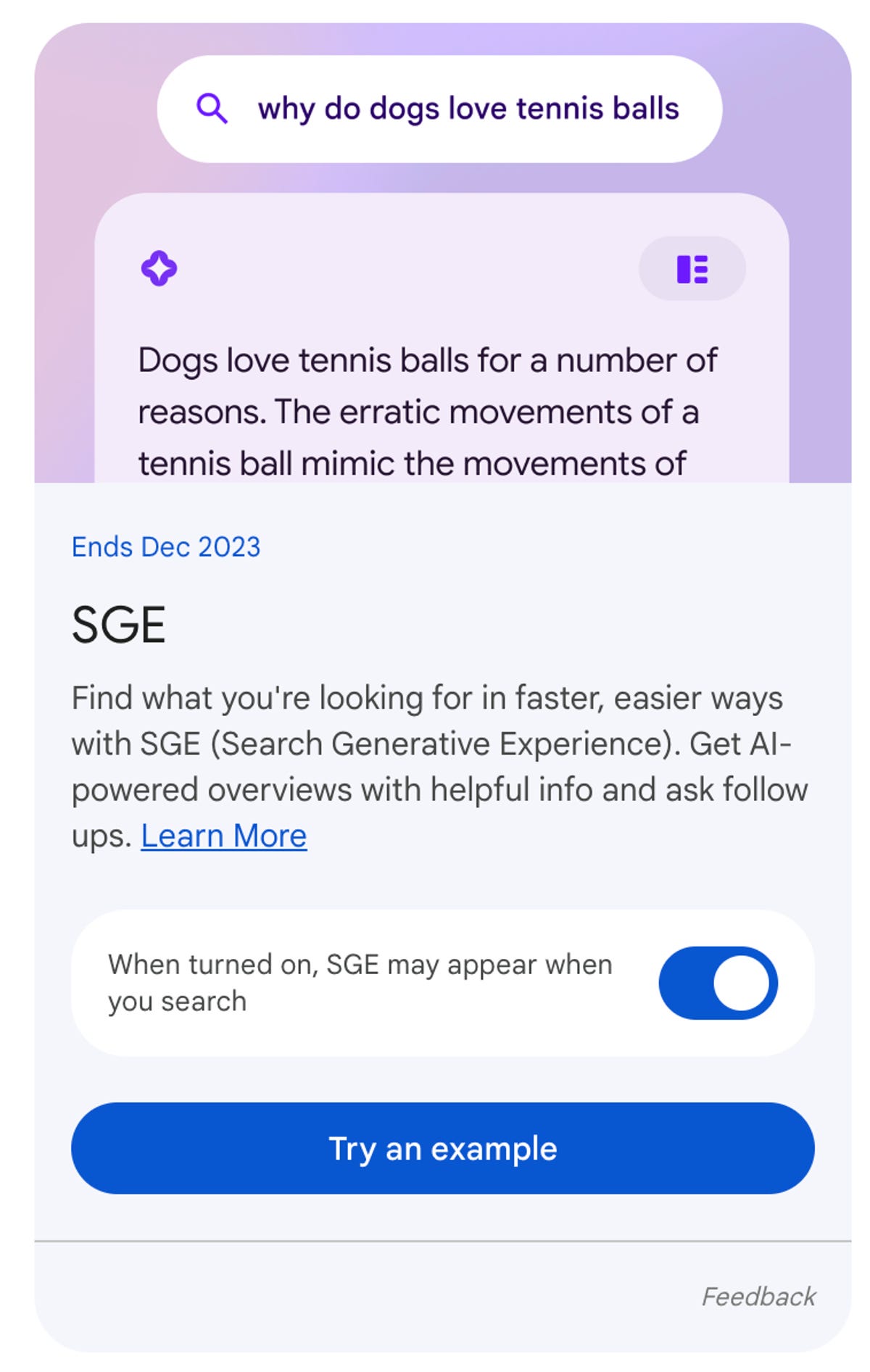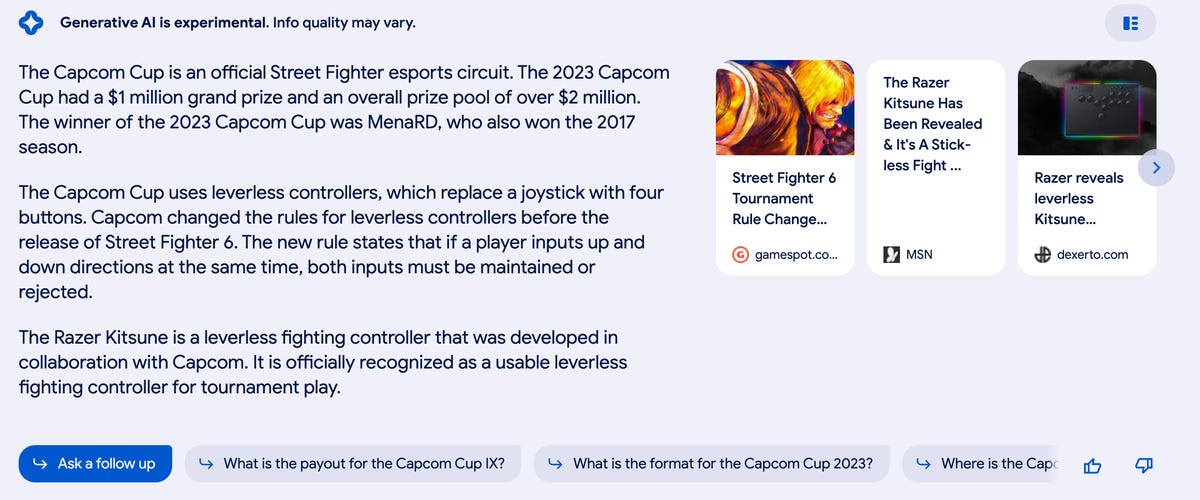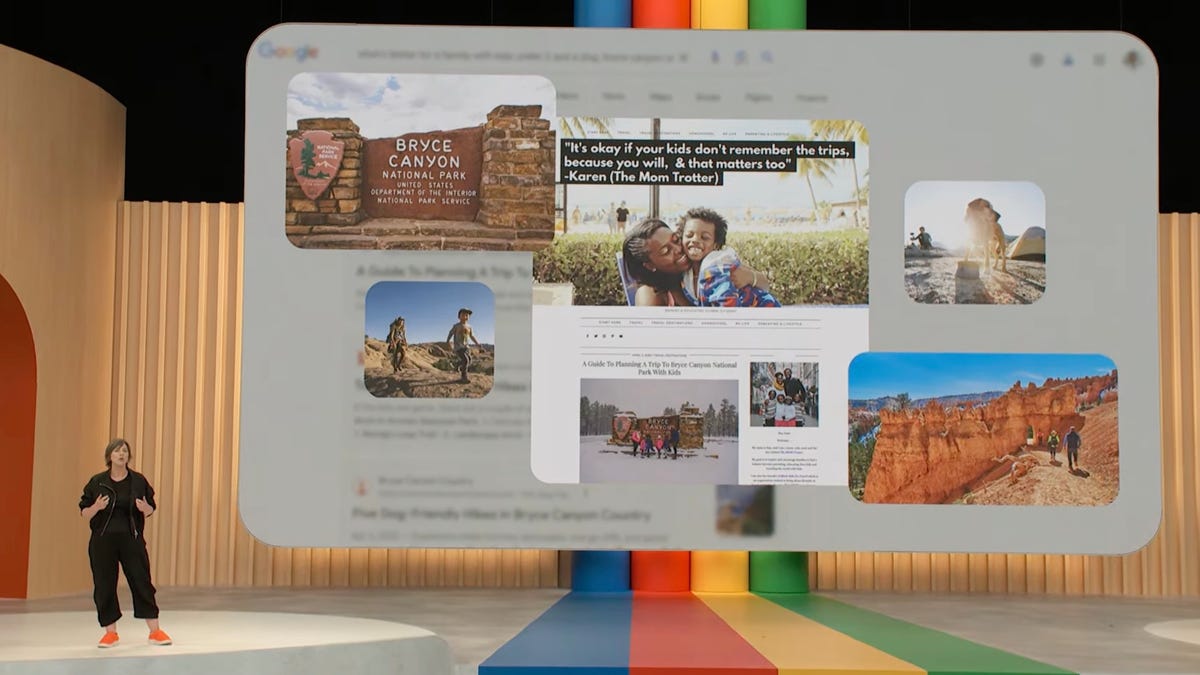Google’s experimental AI-integrated search engine is a ChatGPT-like reimagining of online search. I’ve been using it for the past few weeks, and it’s clearly the future.
Introduced at Google I/O in May, the new AI generative search engine does away with the old-school list of blue links that’s defined Google’s core search experience since the late ’90s. Instead of asking you to click on links, Google, like ChatGPT, uses a generative AI engine that summarizes information from multiple sources automatically. This upends the traditional Google search experience, one requiring that you use keywords and make visits to multiple sites to gather information and formulate an answer in your head. Instead, this new AI-driven search engine does the synthesizing for you.
It also moves Google away from the information gathering business and into the information editing business. Obviously, there isn’t a person at Google editing the AI’s responses. But Google did design the AI engine, which looks at information in a certain way and generates summaries in a certain way. It’s a new relationship Google is making with content publishers, one in which it gains more control over how people view information they search for online.
Just like with ChatGPT, it’s possible to ask follow-up questions. Unlike with ChatGPT, thankfully, links to sources are listed on the side, meaning you can look them over to verify things. This is handy as generative AI engines can make mistakes and “hallucinate,” giving incorrect or misleading answers. That’s because these AI engines aren’t interpreting information the same way we do in our brains, with context of the larger world around us. Instead, they’re simply trying to predict the best next word.
That means it’s totally up to you to make the effort to double check and to discern if information is inaccurate. If the answer sounds correct, you may not go through with all the extra clicking.
It’s likely why Google isn’t making the Search Generative Experience, or SGE, widely available to the public and hasn’t given a release date. The trial run will end in December. But you can sign up to get early access.

Google’s Search Generative Experience is a new take on online search with generative AI built-in.
Generative AI is already changing how people gather information online. When ChatGPT launched late last year, people were awestruck by its ability to respond to pretty much any question with a unique answer. It could generate poems, articles and resumes using its massive trove of text data, in seconds. It uses machine learning to simulate human conversations and has been described as autocomplete on steroids.
The novelty of ChatGPT helped it become the fastest-growing online consumer product in history, reaching an estimated 100 million users in two months. It also made Google searches look tame by comparison. Microsoft quickly upped its investment in OpenAI, the creators of ChatGPT, and integrated its AI tech into Bing Search, seeing a 16% increase in traffic. Google too came out with Bard, a generative AI engine meant to compete with ChatGPT. But this new Search Generative Experience isn’t simply Bard pasted on top of Google. Where Bard is meant to be more conversational, Google’s AI search just wants to give you an answer, minus all the rhetorical frills.
So here’s how it’s been going for me as I tried out Google’s AI Search.
What it’s like to actually use Google’s AI search
Street Fighter 6, Capcom’s latest entry into its storied fighting game franchise, debuted earlier this month to rave reviews. As someone who’s interested in the game, I knew there were tournament rule changes regarding certain types of controllers, but I needed a refresher. I typed “Capcom Cup stickless” into search. I didn’t type a natural-sounding sentence because that’s not how I’ve used Google search for the last 20 years. Instead, I focused on keywords hoping the relevant information would appear. Google’s AI was still able to give me a rundown of the Capcom Cup tournament rule changes regarding “leverless” controllers, including some sources on the side.
I had my answer, and in turn, GameSpot received one fewer click.
Still, I had follow-up questions. I own a Hit Box, a fighting game controller without the traditional arcade stick. It uses buttons for movement, much like when using the WASD keys on a keyboard. I needed to know if my $200 controller would be tournament legal and, if not, what could be done about it. So I asked.

Google’s AI Search in the Search Generative Experience, used to look up information about the Capcom Cup.
Google’s generative AI said the Hit Box would be legal for the 2023 season but didn’t state why. I had to go to the source, in this case DashFight, to learn that a firmware update made the controller rule compliant. While Google gave the correct answer, it wasn’t a very satisfying one. Of course, these are early days, and answers will likely improve as Google issues updates.
I’ve also been feeding Google questions regarding The Legend of Zelda: Tears of the Kingdom. I, like many others, got stuck on the “pinball” shrine, a puzzle room with a not-so-clear answer. Google’s generative AI did a great job of breaking down how to beat the shrine, step by step, but didn’t include any accompanying pictures or GIFs, which would have made understanding it easier. It shows some of the limitations of a generative text AI. In these instances, having sources on the side was handy as many sites embedded plenty of imagery into their articles.
Maybe in the future, Google’s AI could integrate these images into search directly, likely to the chagrin of the sites it’s taking images from. But it shows the uneasiness of using Google’s AI search. It’s obviously parroting content from other sites and suggesting you give them a click but not enforcing it. Many sites sell ads based on the traffic coming in. If traffic starts to wane, then advertisers may consider putting their dollars elsewhere.
The melding of generative AI makes some Google searches faster, but that’s only assuming the answer is either satisfying or accurate. I’ve found some searches to be light on information, requiring additional research. Still, it’s hard not to see this as a major disruption to the online ad-driven search economy. Right now, Google search is the main way many websites gather traffic. If I’m already clicking on websites less, then that could spell trouble for the sites creating the content feeding Google.
But at the end of the day, people want information that’s easy to read quickly. And people will ultimately choose the service with the least amount of friction.
Editors’ note: CNET is using an AI engine to help create some stories. For more, see this post.
